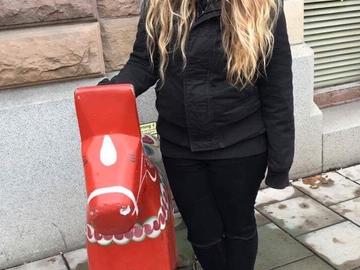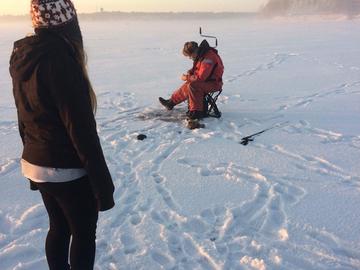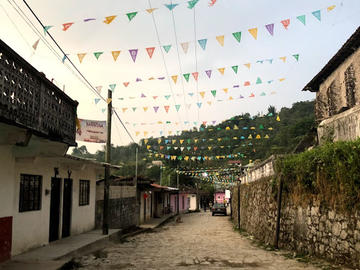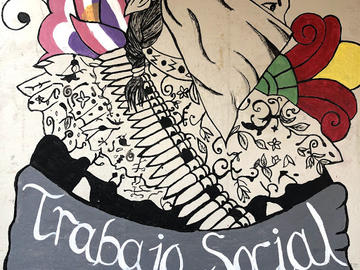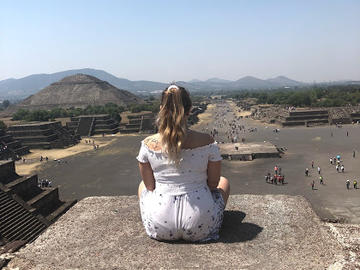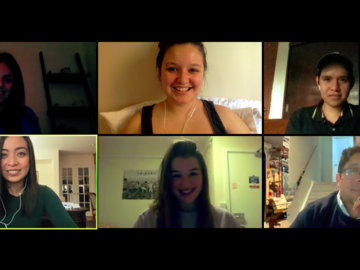Nov. 27, 2020
Class of 2020: While the world was shutting down, social work grad was opening possibilities

As the world was shutting down last spring and summer due to COVID-19, social work student Emily Tetrault was busy finding new ways to make connections.
Her plan to pursue an internationally focused practicum placement seemed to be fading as the world’s nations rolled up their borders and flights were cancelled. However, Tetrault isn’t one to accept anything at face value, and she eventually found a way to make it happen.
“I'd planned to do a research practicum in Hong Kong over the summer,” says Tetrault. “I thought I’d end up having to cancel it because of the protests. I never could have imagined the global pandemic we've actually had this year. So I had to cancel my trip, but I was able to do all the research online. It was incredible because I was doing research with students in Hong Kong and the Philippines.”
A global citizen
Tetrault, who graduated with her Bachelor of Social Work at the virtual ceremony Nov. 26, is clearly a global citizen at heart. Since you can’t enter the Faculty of Social Work directly from high school, Tetrault did her first two years in the Faculty of Arts with the goal of pursuing social work — international social work, from the start.
“Social work is mostly known for casework and the individual-level interventions,” she says. "But once I learned a little bit more about international social work and community- and societal-level social work, I realized it's something I'm really interested in.”
While in Arts, she applied for her first international experience at Umeå University in Sweden. She says she chose Umeå for a few reasons. First, after doing a high school exchange in France, she wanted a place where language wouldn’t be a barrier, and as she says, everyone in Sweden speaks English.
“It's a really small city,” says Tetrault. “It’s about 100,000 people, but the campus is the same size as the University of Calgary. It's really a university town and I've never experienced that. It also has a huge international population. So I was in a community of international students from all over the world. I think it was just as amazing being surrounded by people from all these different countries as it was being in Sweden.”
In Umeå she experienced and learned about the Swedish welfare state and took a victimology course that was part of the university’s Bachelor of Law program. More important, she permanently broadened her horizons.
'Just do it!'
When she was accepted into the Faculty of Social Work, she immediately began looking for other opportunities, settling on a group study focused on social justice and social issues in Mexico under the direction of social work professor Dr. Christine Walsh, PhD. The group’s various experiences included homestays in rural, remote Indigenous communities. They also toured hospitals and refugee agencies and saw, first-hand, the terrific disparities between the super-rich and the very, very poor.
“I think the trip specifically really opened my eyes to grassroots projects,” she says, “and seeing what the local organizations were able to do with really limited resources.”
In Mexico she also approached Walsh, who agreed to help her pursue an international practicum, even though the faculty had no formal avenue for these practicums. Walsh simply said, “Well, if you want to do it, just do it!”
So that’s what Tetrault did — she explored Mitacs International scholarships, which some students on the Mexico trip were pursuing and began exploring faculty connections after Walsh suggested she contact one of her former students, Dr. Crystal Kwan, PhD, who now teaches at Hong Kong Polytechnic University. Kwan was working on an in-person and blended social work student exchange that included students from Hong Kong and the Philippines that was focused on developing cross-cultural competencies. Even though the rest of the world was shut down, Tetrault’s horizons were expanded.
“I was learning all these research skills and doing it all from home,” says Tetrault. “So, while everyone's been so isolated and closed off during the pandemic, I've had more international social work experience working from home than I would have — or have ever had previously.”
'Be innovative. Achieve what you want'
Through her practicum experience and following the end of class work, Tetrault has already worked in a varied number of settings that run the gamut of human experience, from working as an education assistant with daycare students to working in a progressive centre with dementia patients.
In the future, Tetrault is considering pursuing her master’s degree in Europe and perhaps, one day, a PhD. The idea would have likely panicked her former self, which shows how her attitude shifted as an undergrad from “dreading” research to the point where she’s already relishing the thought of writing a thesis.
In the meantime, she’s enjoying her current work in a progressive facility for seniors with dementia. When asked what advice she might give to her former self and to other students, she pauses.
“My advice would be to trust your ability and don't doubt yourself. For others, I would say if you don't know how to do something, or it's not available, just make it available! Find a way to do whatever you want. Don't let what's already there stop you. Be innovative. Achieve what you want.”
- Read more: Check out many more profiles of the outstanding members of Class of 2020. And follow the graduate positivity on social media using #ucalgarygrad

